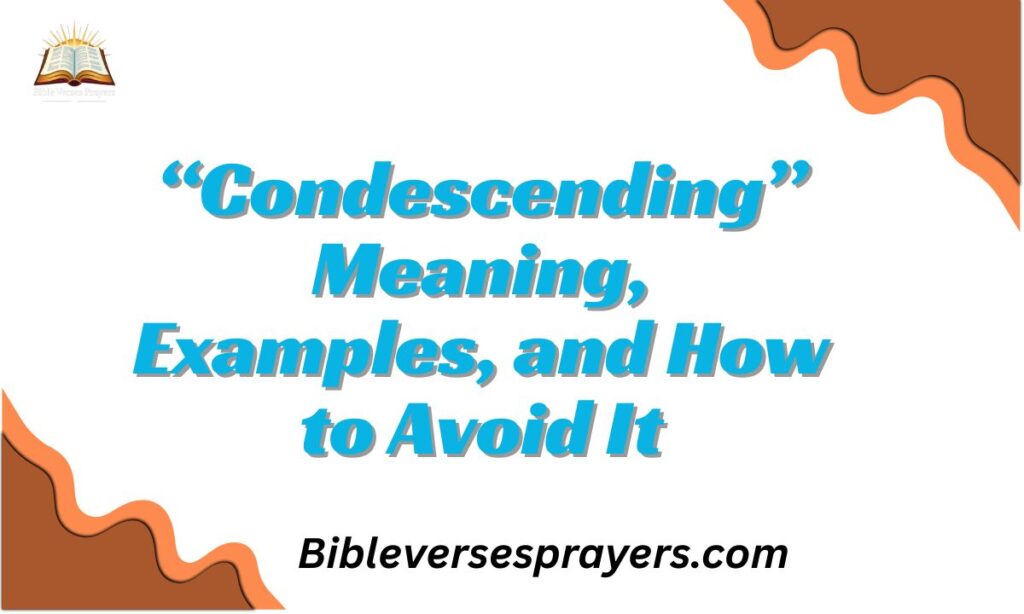The word “condescending” often pops up in conversations, but what does it really mean? It’s a term that describes a specific attitude, one that can rub people the wrong way.
Whether you’ve been called condescending or noticed it in others, understanding this behavior is key to better communication.
In this blog, we’ll explore the meaning of “condescending,” provide examples, and share tips on how to avoid it.
What Does “Condescending” Mean?
The word “condescending” describes an attitude where someone talks or acts as if they are smarter, better, or more important than others. It often comes across as patronizing or dismissive, even when it’s unintentional. In simple terms, being condescending means looking down on someone while pretending to “help” or “teach” them.
Definition of “Condescending”
“Condescending” describes an attitude where someone acts superior, talking down to others as if they’re less knowledgeable or important. It comes from the Latin word condescendere, meaning “to stoop down.” Think of it as someone acting like they’re above you, often with a smug or patronizing tone.
A condescending person might assume they know better or treat you like you’re clueless. It’s not just about what they say—it’s the tone and intent behind it. This behavior can make others feel small or disrespected.
Why It Matters
Condescension can harm relationships. It creates tension, shuts down open dialogue, and makes people feel undervalued. Recognizing it helps you avoid misunderstandings, whether you’re the one being condescending or on the receiving end.
Examples of Condescending Behavior
Common examples include speaking slowly to someone unnecessarily, interrupting, or explaining simple things as if the other person can’t understand. Phrases like “It’s cute that you tried” or “Let me explain this in a way you’ll get” also sound condescending. Even a certain tone of voice or smirk can make friendly advice feel belittling.
In Everyday Conversations
Condescending behavior shows up in subtle ways. Imagine someone explaining a simple concept to you as if you’re a child. For example:
- “Oh, you don’t know how to use this app? It’s so easy, let me spell it out for you.” The tone implies you’re incompetent, even if the words seem helpful.
Another example:
- “Wow, you actually got that right? Good for you!” This backhanded compliment suggests surprise at your ability, hinting you’re usually incapable.
In the Workplace
Workplaces are hotspots for condescending attitudes. A boss might say:
- “I’m shocked you finished this project on time, given your track record.” The praise is overshadowed by the jab at your past performance.
Or a coworker might interrupt:
- “Let me explain this in simple terms since you’re new.” This assumes you can’t grasp complex ideas, even if you’re capable.
On Social Media
Online, condescension often hides behind “helpful” comments. For instance:
- “You clearly didn’t read the article before commenting, did you?” This dismisses someone’s opinion while implying they’re ignorant.
Another example:
- “Nice try, but maybe stick to topics you actually understand.” The tone shuts down discussion and belittles the person.
Why People Act Condescending?

People often act condescending to feel superior or to hide their own insecurities. Sometimes it’s a habit picked up from authority roles or from environments where talking down to others is normalized. In many cases, they may not even realize their tone sounds disrespectful.
Seeking Superiority
Some people use condescension to feel better about themselves. By putting others down, they boost their own ego. It’s often a sign of insecurity rather than true confidence.
Lack of Awareness
Not everyone means to be condescending. They might think they’re being helpful but come across as patronizing. For example, over-explaining something to a capable person can feel like talking down.
Cultural or Social Differences
Sometimes, what seems condescending is a misunderstanding. Tone, word choice, or cultural norms can make neutral comments sound superior. For instance, direct feedback in one culture might feel rude in another.
How to Avoid Being Condescending?
To avoid coming off as condescending, choose your words and tone carefully and show genuine respect for others’ intelligence.
Ask questions instead of lecturing, and listen actively before offering opinions or advice. The key is to communicate with empathy, not ego.
Practice Empathy
Put yourself in the other person’s shoes. Ask yourself: “How would I feel if someone spoke to me this way?” Empathy helps you gauge if your tone might come off as patronizing.
Use Neutral Language
Avoid phrases that imply superiority, like “obviously” or “anyone can see.” Instead of saying, “It’s obvious how this works,” try, “Here’s how this works.” It’s clear without assuming ignorance.
Listen Actively
Don’t assume you know what someone understands. Ask questions like, “Are you familiar with this?” or “Would you like me to go over the details?” This shows respect for their knowledge.
Check Your Tone
Tone matters as much as words. A sarcastic or slow delivery can make neutral words sound condescending. Practice speaking in a warm, even tone to avoid misinterpretation.
Accept Feedback
If someone calls you out for being condescending, don’t get defensive. Reflect on your words or tone. Apologize if needed and adjust. Growth comes from listening.
How to Respond to Condescending Behavior?
When someone speaks to you condescendingly, stay calm and composed instead of reacting emotionally. You can address the behavior politely by saying something like, “I understand what you mean, but there’s no need to talk down to me.” Setting clear boundaries helps preserve both your confidence and mutual respect.
Stay Calm
Don’t let condescension rattle you. Respond calmly to keep the conversation productive. For example, say, “I appreciate the input, but I understand the concept.”
Call It Out Politely
Address the behavior directly but tactfully. Try, “I feel like that comment came across as dismissive. Can we clarify?” This opens dialogue without escalating.
Set Boundaries
If someone’s repeatedly condescending, set limits. Say, “I’d prefer if we could discuss this respectfully.” Clear boundaries discourage ongoing patronizing behavior.
Common Scenarios and Alternatives
| Scenario | Condescending Response | Better Alternative |
| Explaining a task to a coworker | “This is so simple, just follow these basic steps.” | “Let’s go over the steps together. Any questions?” |
| Responding to a question | “Wow, you don’t know that? It’s pretty obvious.” | “Great question! Here’s how it works.” |
| Giving feedback on a project | “I’m surprised you got this far, honestly.” | “Solid work on this! Here’s some feedback.” |
| Commenting online | “Maybe read the post before commenting next time.” | “I see your point! Here’s some context from the post.” |
| Teaching something new | “This is easy, you’ll get it eventually.” | “This can take practice. Let’s try it together.” |
Frequently Asked Questions
What’s the difference between condescending and patronizing?
Condescending implies acting superior, while patronizing often feels like treating someone as less capable, like a child. Both overlap but condescension focuses on ego.
Can condescension be unintentional?
Yes, people may not realize their tone or words seem patronizing. Lack of self-awareness or cultural differences often plays a role.
How do I know if I’m being condescending?
If others seem offended or defensive, check your tone and words. Ask for feedback to catch unintentional condescension.
Is condescension always rude?
Not always, but it often feels disrespectful. Context matters—helpful intent can still come off as condescending if the delivery is off.
How can I address condescension without conflict?
Stay calm and call it out politely. Say, “I feel that came across as dismissive. Can we keep this respectful?”
Final Thoughts
“Condescending” describes an attitude that puts others down, often unintentionally. It’s a communication pitfall that can strain relationships, whether at work, home, or online. By understanding its meaning and spotting it in action.
You can avoid being condescending and handle it gracefully when it comes your way. Empathy, neutral language, and active listening are your best tools. Keep these in mind, and you’ll foster respect and understanding in every conversation.






